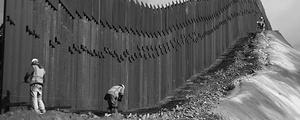PRINCETON, NJ -- Americans' high hopes for the country under the Obama presidency are perhaps best represented by the new USA Today/Gallup poll finding that 72% of Americans think the country will be better off four years from now. Only 20% believe it will be worse off.
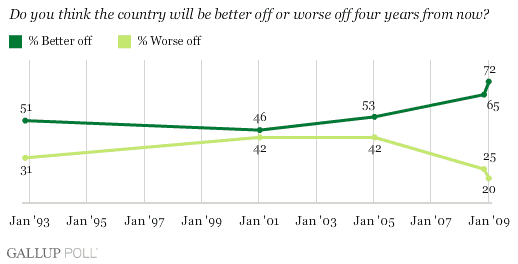
Public optimism about where the country will stand after Barack Obama's first term as president is substantially higher in the Jan. 9-11 survey than was seen in advance of recent inaugural ceremonies. That includes George W. Bush's second turn at the presidential Bible in January 2005, when 53% of Americans said the country would be better off; 46% on the eve of Bush's first inauguration in 2001; and 51% immediately after Bill Clinton's election in 1992.
Optimism about the country's future has even expanded somewhat in the short time since Obama's election victory -- 72% of Americans currently say the country will be better off in four years vs. 65% just after the election -- reinforcing the success Obama has had in maintaining public support during his presidential transition period.
Majority Expect Obama to Be Above Average
Today's relatively high level of optimism about the country may spring from sheer hopefulness on the part of Americans that the serious economic problems facing the country can't last. Indeed, while 92% of Democrats and 67% of independents foresee better times, 52% of Republicans do as well. However, there is also much evidence that it is tied directly to their faith in Obama.
Six in 10 Americans (62%) expect Obama to be an outstanding or above-average president while only 11% think he will be below average or poor. The worst most people say about him is that he will be "average," a view held by 25% of Americans.
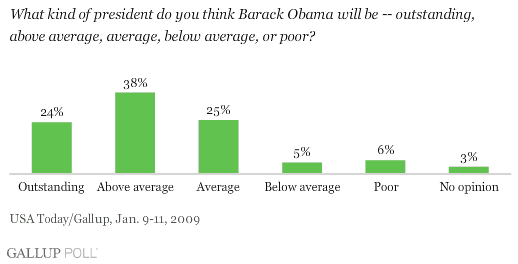
Most Democrats and a solid majority of independents, compared with only 34% of Republicans, predict Obama will be above average or outstanding as president. However, most of the remaining Republicans expect Obama to be average rather than subpar.
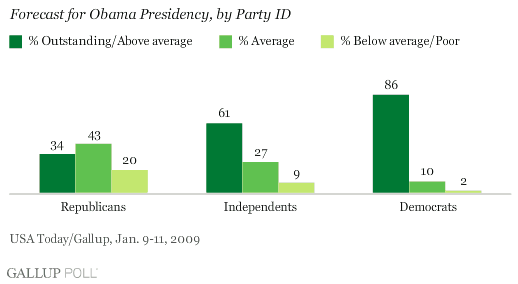
Not only are Americans' expectations for Obama high in an absolute sense, but they are higher than Gallup found for George W. Bush in January 2001, and for George H.W. Bush in January 1989 -- just before each became president. (Gallup did not ask the same question in reference to Clinton before his first inauguration in 1993.)
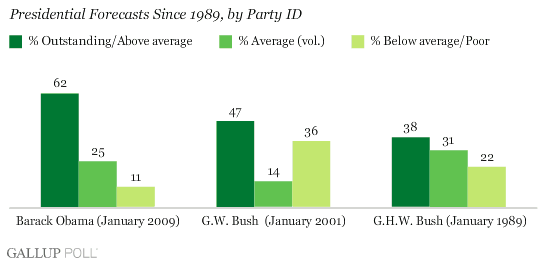
Additionally, the overwhelming majority of Americans, 80%, perceive Obama to be a "uniter" by nature (rather than a "divider"). This contrasts with 58% calling George W. Bush a uniter in 2001. Also, 66% expect the Obama administration to "create a new spirit of idealism" in the country, higher than the 57% saying this of the Clinton administration in 1993.
Presidential Qualities
Beyond these general views about Obama's presidency, most Americans express confidence that he can handle several specific aspects of the job of president.
Confidence in Obama to "work effectively with Congress to get things done" is particularly high. Nearly 9 in 10 Americans say they are confident he will do this, including 44% saying they are very confident. While 74% of Americans in January 2001 were confident in George W. Bush on this matter, only 27% were "very confident."
Obama also generates somewhat higher confidence than did Bush in his ability to "manage the executive branch effectively" (84% vs. 77%) and to "fulfill the proper role of the United States in world affairs" (80% vs. 72%).
Confidence levels in Obama to handle an international crisis and to prevent major scandals in his administration are similar to those initially seen for Bush. Obama lags Bush on only one dimension: using military force wisely.
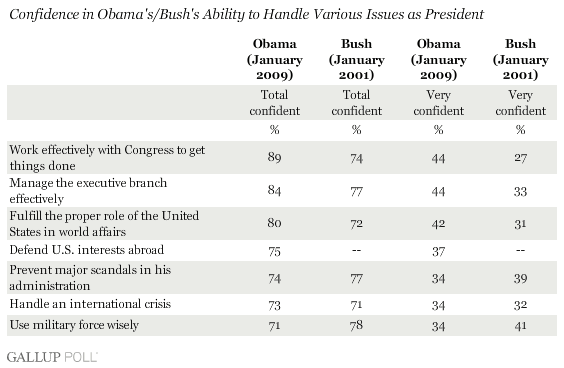
Bottom Line
Americans' broad confidence that Obama will be a successful president only adds to the large body of polling evidence that Americans are investing an extraordinary degree of hope in his coming leadership. Since the election, Gallup has seen this in Obama's consistently high favorability and confidence ratings. It is also evident in Obama's top positioning on Gallup's Most Admired Man list in December -- the first time since Dwight Eisenhower that a president-elect has won this distinction.
In its totality, Obama's extraordinary popularity seems proportionate to the challenges he faces entering office, and may in fact be essential to stirring public support to his side when he needs it in the days ahead.
Survey Methods
Results are based on telephone interviews with 1,013 national adults, aged 18 and older, conducted Jan. 9-11, 2009. For results based on the total sample of national adults, one can say with 95% confidence that the maximum margin of sampling error is ±3 percentage points.
Interviews are conducted with respondents on land-line telephones (for respondents with a land-line telephone) and cellular phones (for respondents who are cell-phone only).
In addition to sampling error, question wording and practical difficulties in conducting surveys can introduce error or bias into the findings of public opinion polls.
